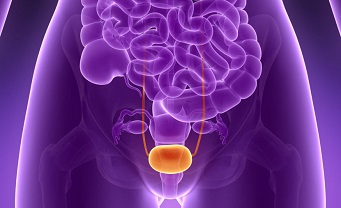SARS-CoV-2 Infections Can Also Lead To Cystitis, Overactive Bladder And Other Urinary Issues!
Source: Medical News - COVID-19 Research - Cystitis Nov 08, 2022 2 years, 5 months, 2 weeks, 3 days, 16 hours, 49 minutes ago
A cohort study by medical researchers from the Department of Urology, Oakland University William Beaumont School of Medicine, Beaumont Hospital-Royal Oak, Michigan – USA has found that COVID-19 increases the incidence of cystitis, overactive bladder and other urinary issues!
 Shockingly, the research findings showed that symptomatic SARS-CoV-2 infection was associated with a three times greater risk of developing new or worsening overactive bladder symptoms among COVID-19 patients.
Shockingly, the research findings showed that symptomatic SARS-CoV-2 infection was associated with a three times greater risk of developing new or worsening overactive bladder symptoms among COVID-19 patients.
Cystitis is the medical term for inflammation of the bladder. Inflammation is when a part of your body is ‘swollen’ and ‘hot’. It can also be painful. Cystitis can be caused when the bladder is irritated or damaged for another reason but most of the time it is due to an infection caused by bacteria. Where it is also called a urinary tract infection (UTI).
Cystitis signs and symptoms may include:
-A strong, persistent urge to urinate.
-Pain or a burning feeling when urinating.
-Passing frequent, small amounts of urine.
-Blood in the urine (hematuria)
-Passing cloudy or strong-smelling urine.
-Pelvic discomfort.
-A feeling of pressure in the area below your belly button (abdomen)
To date, the published literature is sparse on COVID-19-associated cystitis (CAC), a novel condition comprising frequency, urgency, and nocturia after COVID-19 infection. (Nocturia is a condition that causes you to wake up during the night to urinate.)
The research team decided to conduct a cohort study to determine the incidence of CAC and correlation with SARS-CoV-2 antibody levels.
The research was undertaken from a retrospective study approach in which urinary symptoms were scored using the International Consultation on Incontinence Questionnaire-overactive bladder (ICIQ-OAB) at three time points: before the pandemic (January 2020), 2 months after COVID-19 infection (if applicable), and at the time of the study (May 2021).
The study setting was a regional health care system. The 18,785 healthcare employees who took part in the BLAST COVID study group were invited to participate, of whom 1895 responded.
The study outcome measured was the percentage of COVID-positive patients with a significant change on ICIQ-OAB over time. Pearson’s χ2 test was used for comparison of categorical data, and one-way analysis of variance for continuous data and multivariate analysis. A sample size of 618 was calculated for power of 80% and α = 0.05.
It was found that of a total of 1895 participants, 31.9% (n = 605) were positive for COVID-19 according to positive serology or a polymerase chain reaction (PCR) test.
A subgroup, 492 were PCR-positive and had 2-month post-infection data, with 36.4% (179/492) reporting an increase of ≥1 point on the ICIQ-OAB compared to baseline (before the pandemic), with de novo OAB in 22% of these cases (40/179).
Detailed comparison of symptoms between baseline and the study time revealed that 27.4% (31/113) of those with positive serology only (asymptomatic COVID) and 37.8% (186/492) of those with PCR positivity (symptomatic COVID) had an increase of ≥1 point on the ICIQ-OAB, compared to 15.8% (n = 204) of uninfected patients, with odds ratios of 2.
013 (95% confidence interval [CI] 1.294–3.138; p = 0.0015) and 3.236 (95% CI 2.548–4.080; p < 0.0001), respectively.
It was noted that the retrospective nature of the study and the volunteer sample are limitations.
The study findings showed that COVID-19 infection increases the risk of developing new or worsening OAB or overactive bladder symptoms.
Most importantly the study findings showed that symptomatic SARS-CoV-2 infection was associated with a three times greater risk of developing new or worsening overactive bladder symptoms among COVID-19 patients.
The study findings were published in the peer reviewed journal: European Urology Open Science.
https://www.sciencedirect.com/science/article/pii/S2666168322020389
This is the first study to show that COVID-19 infection is associated with an increased risk for developing new or worsening overactive bladder symptoms.
Lead medical researcher, Dr Ly Hoang Roberts, from the Oakland University William Beaumont School of Medicine in Royal Oak, Michigan, and colleagues assessed the incidence of COVID-19-associated cystitis (CAC) and its association with severe acute respiratory syndrome coronavirus-2 antibody levels.
The detailed analysis included 1,895 health care employees participating in the BLAST COVID study group.
The study team found that 27.4 percent of those with positive serology only (asymptomatic COVID-19) and 37.8 percent of those with polymerase chain reaction positivity (symptomatic COVID-19) had an increase of 1 or more point on the International Consultation on Incontinence Questionnaire-overactive bladder since baseline, versus 15.8 percent of uninfected patients (odds ratios, 2.0 and 3.2, respectively).
Dr Roberts told Thailand
Medical News, "The exact pathophysiology of CAC is yet to be discovered, although others have hypothesized that the increase in systemic inflammation on COVID-19 infection can lead to bladder inflammation and thus bothersome urinary symptoms.”
A number of studies are already showing that COVID-19-associated cystitis (CAC) is becoming a growing occurrence in Long COVID.
https://www.ncbi.nlm.nih.gov/pmc/articles/PMC8597545/
https://www.nature.com/articles/s41585-022-00586-1
Some studies claim that COVID-19-associated cystitis (CAC) could be attributed to the cytokine storms induced by the SARS-CoV-2 virus.
https://pubmed.ncbi.nlm.nih.gov/33213997/
Other claim that the cause could be direct involvement of the SARS-CoV-2 virus itself as studies have shown that the virus is present in urine samples as well!
https://www.jmatonline.com/index.php/jmat/article/view/12671
https://www.ncbi.nlm.nih.gov/pmc/articles/PMC7282421/
https://www.sciencedirect.com/science/article/pii/S266703802100051X
https://kidney360.asnjournals.org/content/2/6/924
https://www.frontiersin.org/articles/10.3389/fpubh.2020.569209/full
For the latest
COVID-19 Research, keep on logging to Thailand
Medical News.
